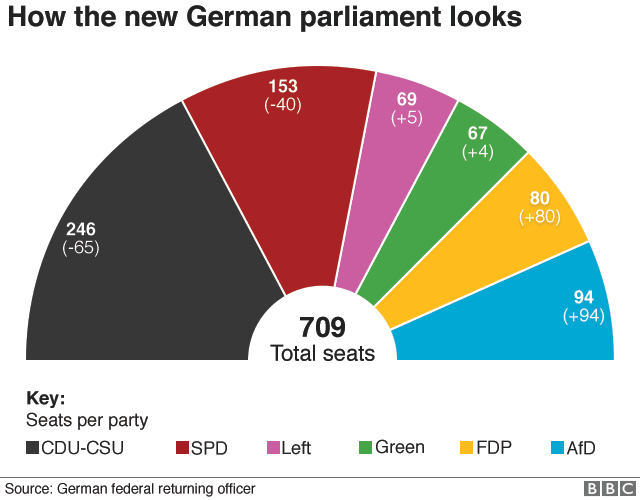COALITION COLLAPSE: Soros Pawn Merkel Finally On Her Way Out
Germany’s Merkel suffers blow as FDP pulls out of coalition talks
BBC
Talks on forming a coalition government in Germany have collapsed, leaving Angela Merkel facing her biggest challenge in 12 years as chancellor.
The free-market liberal FDP pulled out after four weeks of talks with Mrs Merkel’s CDU/CSU bloc and the Greens.
FDP leader Christian Lindner said there was “no basis of trust” between them.
What happens next is unclear, but Mrs Merkel is due to meet President Frank-Walter Steinmeier, who has the power to call snap elections.
Her bloc won September’s poll, but many voters deserted the mainstream parties.
Mrs Merkel said she regretted the collapse of the talks, adding she would meet the German president later on Monday to formally tell him negotiations had failed.
“As chancellor, I will do everything to ensure that this country is well managed in the difficult weeks to come,” she said.
Aside from early elections, Mrs Merkel could also form a minority government with the Greens.
The second-largest party in parliament, the Social Democrats, have ruled out returning to a coalition government with Mrs Merkel.
Back to the ballot box?
Analysis by the BBC’s Jenny Hill in Berlin
This is – for post-war Germany – an unprecedented political crisis that could spell the end of the Merkel era.
Weakened by a poor election result in September, the proposed coalition was Mrs Merkel’s only shot at forming a new government.
Germany will now – in all probability – have to go back to the ballot box. But it’s not at all certain that Mrs Merkel’s party will want her to lead them into a fresh election.
The ensuing uncertainty has consequences beyond Germany. Mrs Merkel – who did not attend a summit of EU leaders in Sweden last week – will remain preoccupied with domestic affairs for some time yet. This was, she said last night, a time for deep reflection.
Mrs Merkel must now fight for political survival. The leader who for so many people has represented stability now is fast becoming a symbol of crisis in the heart of Europe.
‘Goodbye!’
The FDP’s leader emerged from the talks venue in the middle of the night surrounded by his party colleagues and told waiting reporters that the party was leaving the process.
He said that while the FDP knew it could not steer the course of the entire republic with just 11% of the vote, the parties involved in talks had “no shared vision” of how the country should be modernised, and four weeks of talks had left them with “many inconsistencies, unanswered questions and conflicts”.
“Today there was no progress – rather there were setbacks because targeted compromises were questioned,” Mr Lindner said.
“It is better not to rule than to rule badly. Goodbye!” he added.
Mrs Merkel blamed differing cultures and styles for the collapse but said: “We think we were on a path to finding a solution.”
Co-leader Simone Peter of the Greens, meanwhile, said the FDP had been “irresponsible, dubious and calculating”.
Her party colleague Katrin Göring-Eckardt said the Greens had been “ready to talk” and had found a “much greater understanding” with the CDU and FDP through the talks, especially over migration politics, climate change and agriculture.
The parties involved in the talks are reported to be deeply divided over tax, asylum and environmental policies.
One of the sticking points is reported to be whether Syrian refugees should be allowed to bring family members to join them in Germany.
Mrs Merkel’s conservatives, mindful of the electoral success of the anti-Islam, anti-immigrant AfD, are cautious and want to extend a moratorium on so-called family reunions.
After winning its first parliamentary seats, the far-right nationalist AfD (Alternative for Germany) vowed to fight “an invasion of foreigners” into the country.

